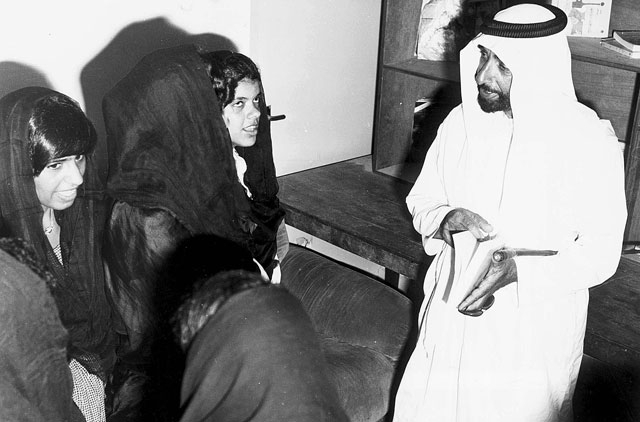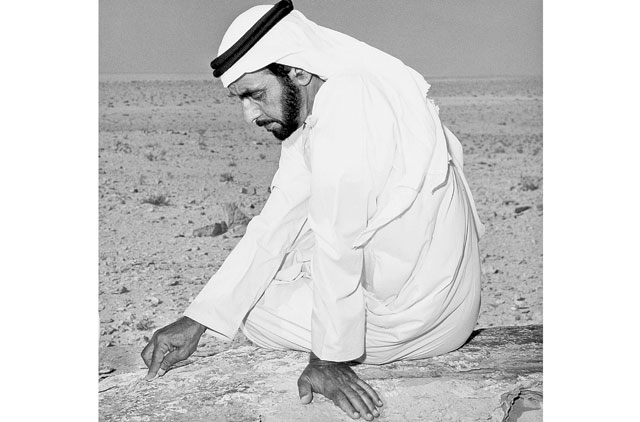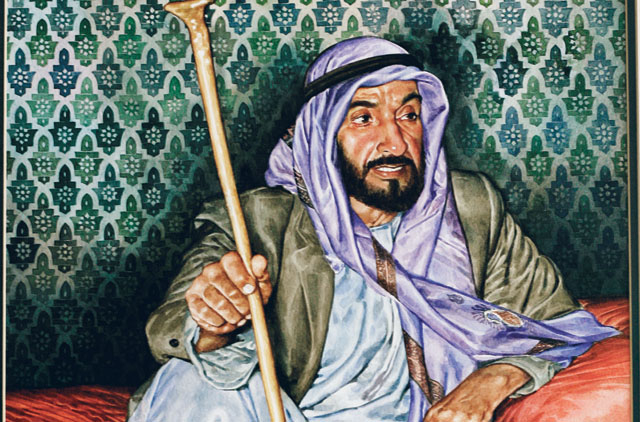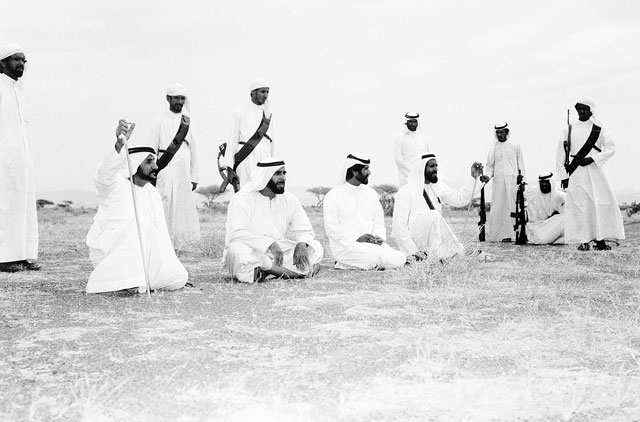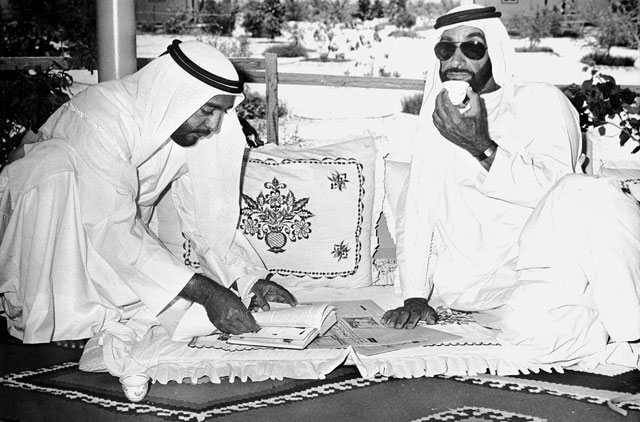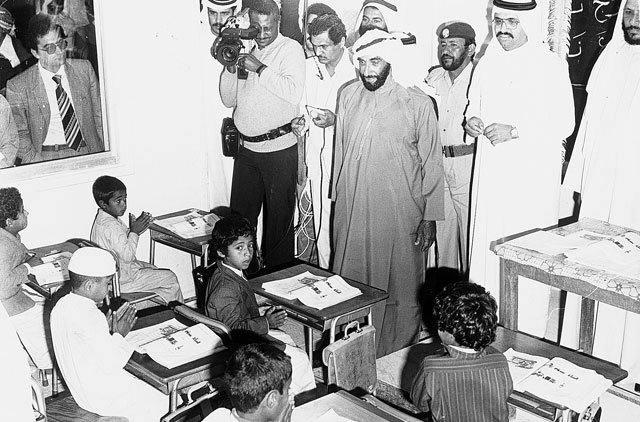Dubai: Today, Ramadan 19, marks the seventh death anniversary of Shaikh Zayed Bin Sultan Al Nahyan, the UAE's founding father, who passed away on November 2, 2004, which fell on Ramadan 19.
Starting this year, the UAE will mark his death anniversary on Ramadan 19 every year with various national programmes and Friday sermons talking about his achievements as the UAE's visionary leader.
Shaikh Zayed, one of the great nation-builders of all time, remains a role model for his people and the entire Arab world.
He was the Arab world's longest-serving president and played a leading role as the Ruler of Abu Dhabi for half a century since 1966 and as president of the UAE for more than three decades. He put the UAE on the world map. His astute statesmanship and negotiation skills won him popularity among Arab and world leaders.
When Shaikh Zayed was born in 1918, the Trucial States were not developed. The life of the people who lived by the sea revolved around fishing and pearl diving. Agriculture was the means of livelihood for those who lived away from the sea and near oases.
As a young man, Shaikh Zayed lived the life of a bedouin. Like his people, he knew what it meant to be poor and lead a harsh life. This taught him the values of simplicity, which he held on to all his life.
When the British announced they were withdrawing from the Gulf in 1968, after having occupied the region since 1820, Shaikh Zayed called for the formation of a union of the different emirates, including Bahrain and Qatar.
He had exceptional negotiation skills through which he created consensus and agreement among his fellow rulers, along with Shaikh Rashid Bin Saeed Al Maktoum. He was elected the first president of the UAE.
In 1971, after the federation was formed, Shaikh Zayed said: "There are two kinds of ambitions: firstly, the ambition to do something and secondly, the ambition to perform your duty which is actually the one I am seeking to achieve right now. We hope to take the UAE federation in the right direction. This is our foremost responsibility and the responsibility of all UAE citizens."
As a leader Shaikh Zayed focused on utilising the resources of the country for the benefit of the people in terms of spending on education, employment and housing. He established the UAE's modern infrastructure in the form of roads, housing, schools and health services.
He said: "Our policy was first to focus all our efforts on developing the country and its citizens. When I look around at what has been achieved I realise things have happened before the expected time. It is like a dream. I had dreams, but had never believed that this would all happen in such a short span of time."
Education was Shaikh Zayed's top priority, as he saw it as "a lantern that lights one's way in a dark alley". A federal law made education free and compulsory up to the primary level. Free education was offered to everyone, including the children of Arab expatriates.
In 1987, he said: "Spreading education is a national duty and the government has put forth all its options in making it happen for tomorrow's generation. This is our way of compensating for what we have been deprived of in the past."
Shaikh Zayed was also a strong supporter of women's rights and believed that they must participate in building the nation in accordance with Islam.
"Islam gives women their rightful status and encourages them to work in all sectors as long as they are accorded the appropriate respect," he had said.
Under Shaikh Zayed's rule, the UAE adopted an open-minded policy towards expatriates.
In 1990, he said: "Man has to be kind not only to humans but also to animals and plants as God bestows kindness on those who show kindness to others."
He also played a major role in the formation of the Gulf Cooperation Council (GCC), which was launched in Abu Dhabi in 1981. "There is no competition or disagreement between us and our brothers in the GCC. We wish they come closer to each other and hope a way opens up for an overall unity among us," he said.
His philosophy of Arab brotherhood also extended across the Arab world. In his famous statement emphasising that the Gulf's oil wealth was a part of the Arab world's resources, he said: "Arab oil can never be dearer than Arab blood."
The UAE as a country and its people are fortunate to have had Shaikh Zayed as their leader. He guided the country towards development and today it stands shoulder to shoulder with the world's most modern and developed countries.
Words of wisdom (statements by Shaikh Zayed)
Oil is not everything
“The people of the UAE have survived for hundreds of years without oil, and are capable, if necessary, of living without it for many more centuries. I know our economy and national progress depend on oil, but this does not mean oil is everything for us. For the UAE, oil is a means and not an end in itself. The UAE will use oil only in the way she judges it to be compatible with her political, social and progressive programme.” (1983)
Investing in citizens
“I have a strong belief that the UAE citizen is the [main] resource of the country and the pillar of civilisation. Our achievements will be of no value without a conscious and educated generation Hence, the development of manpower should precede development in all other sectors.” (1985)
“Sincerity, diligence and dedication should be the motive of every citizen.” (1998)
Ruler-people relationship
“The ruler should not have any barrier which separates him from his people.” (1991)
“No one should act as if he owns others. Those in a position of leadership have the responsibility to deal with their subjects with compassion and understanding, because this is the duty entrusted to us by God Almighty who commands us to treat all living creatures with dignity and respect.” (1998)
Democratic ways
“Our system of government is based on our religion and that’s what our people want. Should they seek alternatives, we are ready to listen to them. Our people should voice their demands openly knowing that our problems are common.”
“Arab youth are the sword and shield of the nation. They are the protectors of the Arab nation.” (1981)
Education
“Spreading education is a national duty and the government has put forth all its options in making it happen for tomorrow’s generation. This is our way of compensating for what we have been deprived of in the past.” (1987)
Timeline
1918 Shaikh Zayed Bin Sultan Al Nahyan, the fourth son of Shaikh Sultan Bin Zayed Bin Khalifa Al Nahyan, is born in Abu Dhabi’s
Bani Yas district.
1926 By the age of 10, Shaikh Zayed memorises most of the verses in the Quran.
1946 He is appointed Ruler’s Representative with his office situated in Al Muwaiji in Al Ain.
1953 Travels abroad for the first time, visiting western countries, including France, Great Britain, and the US. Shaikh Zayed is impressed by the progress he sees in these countries and decides to pursue a similar approach to development in his own country. While visiting some hospitals in France, he is impressed by the sight of healthy babies and ponders the plight of thousands of malnourished children back home . He decides to work for their welfare.
1961 Orders the building of the first mud road that runs from the palace to Al Maqta Bridge in Abu Dhabi. Shaikh Zayed mobilises all the available trucks at the time to transport material for the construction of the road.
1966 Becomes the Ruler of Abu Dhabi. The year also witnesses the establishment of a number of new administrative departments headed by members of the Al Nahyan ruling family and some prominent citizens.
1971 Shaikh Zayed, representing the UAE, and Sir Geoffrey Arthur, the last Political Resident in the Gulf, sign a treaty of friendship between Britain and the UAE.
- The UAE is established as a federation including the emirates of Abu Dhabi, Dubai, Sharjah, Ajman, Umm Al Quwain and Fujairah takes shape under the leadership of Shaikh Zayed. The emirate of Ras Al Khaimah joins a year later.
- Shaikh Zayed is elected President and Shaikh Rashid Bin Saeed Al Maktoum, Ruler of Dubai, becomes Vice-President of the UAE.
- The federation is based on achieving four main objectives: building an educated society; solving regional issues by peaceful means; strengthening ties between Arab countries — politically, economically and culturally — and finally, actively participating in international forums and organisations.
- Executive, legislative and judicial branches are established. Each emirate is represented in the national assembly and the Ruler of each emirate is entitled to vote in the Supreme Council of Rulers.
- The Federal National Council (FNC) is established with 40 members. Abu Dhabi and Dubai are each represented by eight members, Sharjah and Ras Al Khaimah by six, and four members each represent the rest of the emirates.
- The Rulers agree that the Federation’s Constitution would be provisional for five years, after which it would be replaced by a permanent one.
- The UAE joins the Non-Aligned Movement.
1981 The Gulf Cooperation Council, a union between Bahrain, Kuwait, Oman, Qatar, Saudi Arabia and the UAE, is formed with the purpose of establishing joint projects in various fields. The Council’s first meeting is held in Abu Dhabi under the chairmanship of Shaikh Zayed.
1990 The UAE condemns the Iraqi invasion of Kuwait. Shaikh Zayed states the UAE has no choice but to support the Kuwaitis. He rejects Saddam Hussain’s claim of a connection between the Palestinian issue and the Kuwaiti invasion. Shaikh Zayed refuses to compromise with Saddam, declaring it was not “our duty to save his face”.
1996 After undergoing neck surgery in the US, Shaikh Zayed is welcomed back with festivities and events marking his safe return.
2000 Shaikh Zayed calls on Iran to end its occupation of the three islands of Greater and Lesser Tunbs and Abu Mousa peacefully.
2001 In response to the 9/11 attacks, Shaikh Zayed reaffirms UAE’s support for an international campaign against terrorism.
2004 Shaikh Zayed passes away. His Highness Shaikh Khalifa Bin Zayed Al Nahyan is elected President.


